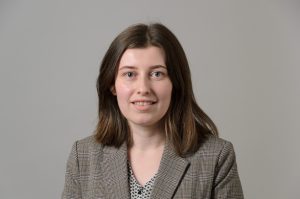NSF EAGER grant supports innovative research by Monika Filipovska to apply quantum computing to critical infrastructure challenges
In an era of rising climate threats, aging infrastructure, and increasingly complex transportation systems, UConn's Monika Filipovska is leading a bold and timely research initiative that could revolutionize how cities prepare for and respond to disruptions.
Supported by a new grant from the National Science Foundation (NSF), her work seeks to harness the power of quantum computing to build more reliable, resilient transportation networks-the essential systems that move people, goods, and services every day.
Her project, titled "Quantum Algorithmic Foundations for Reliable Transportation Networks," was awarded through the NSF's highly competitive Early-concept Grants for Exploratory Research (EAGER) program. These grants support early-stage, high-risk research with the potential to transform entire fields. Filipovska's work does just that.

"Transportation systems are the backbone of our society, yet they face uncertainty at every turn-whether from sudden downpours, equipment failures, or peak-hour congestion," says Filipovska. "We need new tools to make these systems smarter, more adaptable, and more resilient-and quantum computing offers that potential."
Engineering Meets Quantum: A Rare but Promising Combination
A faculty member in UConn's School of Civil and Environmental Engineering and an active contributor to the UConn Quantum Consortium, Filipovska specializes in modeling complex systems-such as road networks, transit routes, and freight corridors-that operate under uncertain and dynamic conditions.
Traditional computer algorithms often struggle with the unpredictability of these systems, particularly when variables like weather, traffic incidents, or shifting demand are involved. Quantum algorithms, however, are uniquely suited to analyze massive datasets, explore countless scenarios simultaneously, and identify optimal strategies under uncertainty.
This cross-disciplinary project is one of the first major efforts to directly apply quantum computing techniques to transportation engineering-positioning UConn at the forefront of a rapidly emerging research frontier.
Public Impact: Stronger Infrastructure, Safer Communities
Filipovska's research is about more than abstract computation-it has real-world stakes. Reliable transportation systems are critical to public safety, economic stability, and emergency response. As climate change continues to drive extreme weather events, the ability to anticipate and adapt to disruptions is more urgent than ever.
Quantum-based models could help cities simulate cascading failure scenarios, optimize traffic flow in real time, or prioritize repairs after a natural disaster-capabilities that could save lives and resources.
"By integrating quantum innovation with civil infrastructure, we're not just tackling complex engineering problems-we're helping communities prepare for tomorrow's challenges," says Filipovska.
UConn as a Hub for Interdisciplinary Innovation
The project also reflects UConn's strategic commitment to cross-disciplinary, high-impact research. Through the UConn Quantum Consortium, faculty from physics, engineering, computer science, and mathematics collaborate on cutting-edge applications of quantum technologies. Filipovska's research exemplifies the Consortium's mission of moving quantum science from the lab into real-world systems.
"Dr. Filipovska is a bridge-builder and a leader in Connecticut's quantum technology future," says Pamir Alpay, UConn's vice president for research, innovation, and entrepreneurship. "She brings people together across disciplines, with a focus on projects that impact our cities and roads. Her research perfectly complements efforts of UConn's Quantum Consortium and our statewide QuantumCT initiative. Quite literally, her work keeps our traffic systems in motion, applying advanced quantum information theory that surpasses even the most elaborate algorithms."
A Vision for the Next Generation of Thinkers
In addition to advancing research, Filipovska is passionate about mentorship and student engagement. Her work opens the door to new learning and career pathways that combine quantum science with practical problem-solving-an attractive combination for students eager to make real-world impact.
"Now is the time for students in engineering, physics, data science, and urban planning to come together in building the next generation of infrastructure systems," she says. "Their creativity and collaboration will drive the breakthroughs our society needs."
The NSF EAGER project is just the beginning. Filipovska plans to use its results to inform more robust infrastructure models, future grant proposals, and expanded collaborations with public agencies and private-sector innovators.
Her work serves as a powerful reminder of the role universities like UConn play in preparing society for the challenges ahead. By embracing bold ideas and supporting visionary researchers, UConn is helping shape a smarter, more resilient future for everyone.






